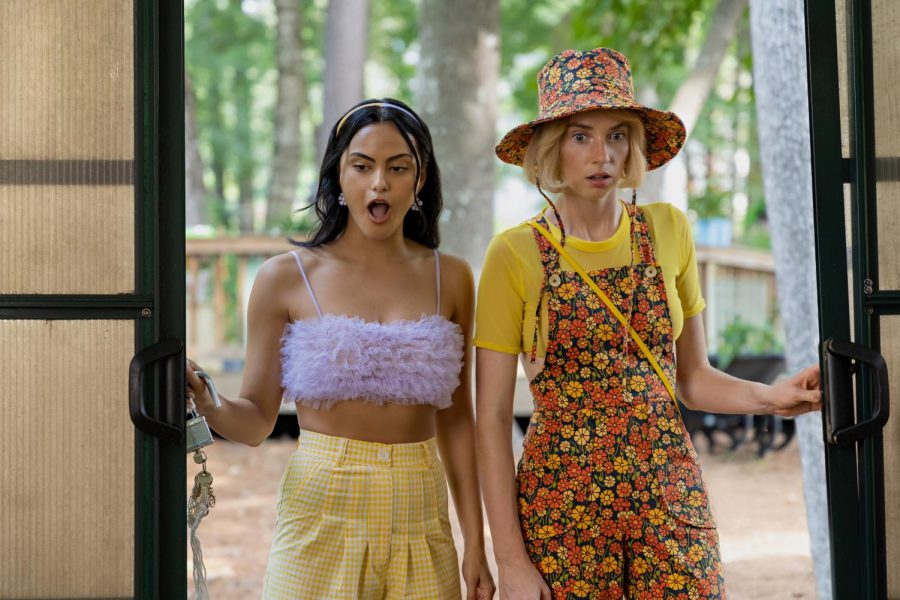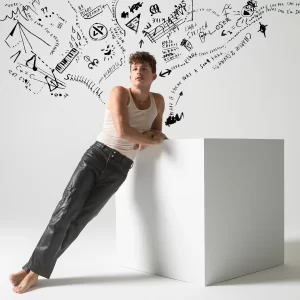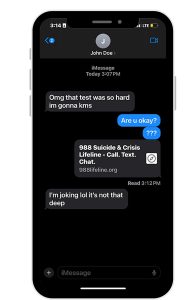Netflix’s ‘Do Revenge’ Is the Perfect Teen Movie, but Falls Just Short of Perfect Representation
Netflix
Camila Mendes and Maya Hawke star as conflicted teens Drea Torres and Eleanor Levetan in ‘Do Revenge.’
October 12, 2022
I watched Do Revenge for two reasons: one, I’m a major Maya Hawke fan, and two, I’m willing to sample just about any queer teen drama.
Hawke stars as awkward outcast Eleanor Levetan opposite Camilla Mendes’s Drea Torres, a Yale-aspiring popular girl. Drea has recently fallen from grace after her ex boyfriend leaked her nudes, and Eleanor is seeking revenge against an ex who outed her as gay. So the two newfound friends masquerade as strangers to bring comeuppance to each other’s enemies.
Even as more mainstream Netflix media starts to explore LGBTQ+ representation (see Heartstopper or Young Royals), sapphic representation is incredibly hard to come by. In Hawke’s other 2022 Netflix hit, Stranger Things, her character, Robin, is gay – but the word lesbian is never used, and Robin has yet to have an actual relationship on the show or kiss another girl on screen. Robin’s gay male counterpart, Will Byers, is similarly lacking in actual substance. But Will’s story and coming-of-age are more front-and-center. This gap in visibility is noticeable, and it’s why releases like Do Revenge are so important.
Still, I have to quibble with how, exactly, that representation played out. Eleanor is gay, sure. Her story is at the forefront and she establishes a real relationship with another character on the show. It’s just that it was the wrong character. Hawke’s chemistry with co-star Mendes was palpable, and yet the movie avoided making them the core couple. It almost felt like Do Revenge hesitated to make both main characters gay in order to preserve heterosexuality in the lead roles. This weakened the film for me.
Queer representation fits into two categories for me: either tolerance or advocacy. In representation of tolerance, queer characters exist in an environment where hatred is absent and queerness is not made a big deal of – it’s just a piece of the world, and queer characters’ stories aren’t just centered on coming out or transitioning. Queer representation that seeks to advocate more directly includes the reality of discrimination and cruel jokes, and of coming to terms with yourself. In Do Revenge, homophobic bullying is very present. People are mean and it’s reason for queer characters to feel isolated and resented – just like real life. Neither of these forms are better or worse than the other, but they’re distinct.
Do Revenge falls just short of relatability, and therefore of meaningful advocacy. Up until the finale, when Drea ends up with a male character, it seems like she’s on the precipice of self discovery. It seems like she’s struggling internally with unavoidable feelings for Eleanor, feelings she wants to ignore but can’t, despite their complicated relationship. Eleanor, despite being openly gay, also seems to be in denial about feelings for Drea (even after it’s revealed that Eleanor has been trying to sabotage Drea all along). But the filmmakers flubbed this opportunity. Even aside from the disappointment of them not getting together, Drea and Eleanor’s actual love interests feel one-dimensional and fail to add anything special to the main players’ development. All of this feels less relatable and more thrown-together, when it would’ve felt more natural to end the movie as a complicated love story between Drea and Eleanor.
Yet despite its flaws, Do Revenge is probably my favorite recent teen movie. It is just so good. The characters draw you in, even when they’re sucky people. Despite its somewhat awkward takes on Gen Z humor and culture, the movie doesn’t feel fake. It doesn’t try to mimic teenagers in a phony way, because it’s not really about high school. It feels fantastical enough to represent the lives of ridiculously rich private high schoolers with hilariously misplaced priorities. The movie satirizes teen tropes and mocks white boy culture. It feels like a satisfying clapback against teenagers who act without second thought, and it makes a fool of the popular-type characters, but in the end, the main characters are just as foolish, despite their expert scheming.
I had a lot of fun watching it, and I didn’t cringe or feel bored, as I often do when watching teen dramas that star actors in their mid twenties. And even though their chemistry was wasted romantically, Mendes and Hawke still do an excellent job of playing off each other and making a story that fits.
Do Revenge is proof that although queer representation has come a long way in mainstream media, it still has quite a ways to go. Despite that, this movie is successful in what it wants to do, and by far one of the best streaming-only movies of 2022.





















![In a recent surge of antisemitism nationally, many have pointed towards social media and pop culture as a source of hate. “Many far-right people have gone on [X] and started just blasting all their beliefs," Sophomore Scott Weiner said.](https://unionstreetjournal.com/wp-content/uploads/2023/10/antisemitism-popculture-2-1200x675.jpg)
